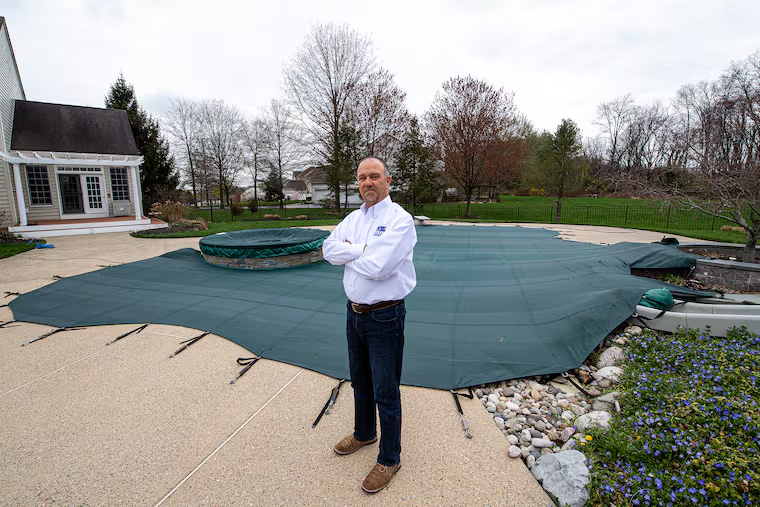Demand for pools surges for second year amid canceled vacations and long days at home
Some pool contractors in the region report they have a wait-list of more than a year. They're also dealing with supply shortages.

For just about six weeks last spring, demand for pools stalled as the coronavirus pandemic seized the world’s attention.
But by the time summer came and families had accepted they wouldn’t be taking their yearly trip to the beach, lake, or amusement park, inquiries for new pools began to pile up quickly, with demand outstripping available labor and resources at some companies, pool contractors said.
“This is the biggest demand we’ve ever seen for our products in recent memory,” said Randy Budd, owner of Budd’s Pools & Spas in Woodbury, Gloucester County. “It’s unbelievable. The bad news is the industry is experiencing unprecedented shortage in every component almost of what we sell and build while the demand is there.”
Now more than a year from the start of the pandemic, strong interest in new pools continues, Budd said. Contractors have remained appreciative of new business — an in-ground pool commonly starts at $40,000 — but some expressed stress at scarce materials that have become increasingly harder to find. They pointed to the severe winter storm in Texas in February that in addition to killing 111 people and causing widespread power outages, damaged pool equipment across the state. When that equipment was replaced, Budd said, less was left for pool builders elsewhere in the United States.
Months earlier, in late August, Hurricane Laura, a Category 4 storm, had touched down in Louisiana. Destruction from that storm caused a fire at BioLab, a factory in western Louisiana that produced chlorine tablets, used to sanitize pools. That disaster also placed greater strain on the pool industry, Budd said, calling it “a perfect storm.”
With limited resources, pool contractors’ wait lists are long.
“It is out of control,” said Michael Neri, the owner of Artistic Pools in Cinnaminson, Burlington County. “We’re booked until June 2022.”
His team installs around four pools a week, he said, with each pool often costing between $40,000 and $60,000.
Anthony & Sylvan Pools in Doylestown always has a long queue of customers asking for a pool — “hundreds waiting at any given time,” said Tom Casey, Anthony & Sylvan’s vice president of sales.
Pool construction has become elaborate, with some homeowners adding pergolas and outdoor kitchens to present the pool area as almost another room to the house. Such projects, Casey said, can run up to a half-million dollars and are not an undertaking for those seeking instant gratification. Pool contractors have to obtain municipal permits to build, dig out space for the pool, and allow two to three months to finish construction.
“It’s a very personal thing for folks for why they find themselves in the market,” he said. “The COVID restrictions have thrust a bunch of people into that space where they weren’t there before. ... People still don’t feel quite confident in taking some of those vacations and are still inquiring in great numbers about backyard swimming pools.”
With a strained pipeline for materials, as well as a thinned labor force for some companies, the timeline to build a pool has grown longer, contractors said.
For in-ground pools, contractors have had to grapple with a shortage of pumps, lights, pipers, skimmers, floaters, and pool walls. There has been an enduring shortage of liners and ladders for above-ground pools.
“A lot is produced domestically but sourced worldwide,” said Budd, of Budd’s Pools & Spas, noting that many pool supply manufacturers are completely sold out. “A pump is made in the U.S., but the motor’s made in Mexico or elsewhere, or the components inside the motor are made in Mexico.”
Budd said his company had found a workaround: building their own pool walls out of concrete instead of trying to source hard-to-find steel or polymer pool kits from manufacturers. It’s an expensive undertaking, he said, since he had to buy the forms for the walls, but doing so has given him some more independence from the supply chain.
“It’s a bit of a stressful period for anybody in our business,” he said. “It’s a very fluid, day-to-day situation. All of this has just come to light as we’re getting ramped up for our season, so it’s all just happening. In the last two to three weeks, we’re really seeing how bad it is.”